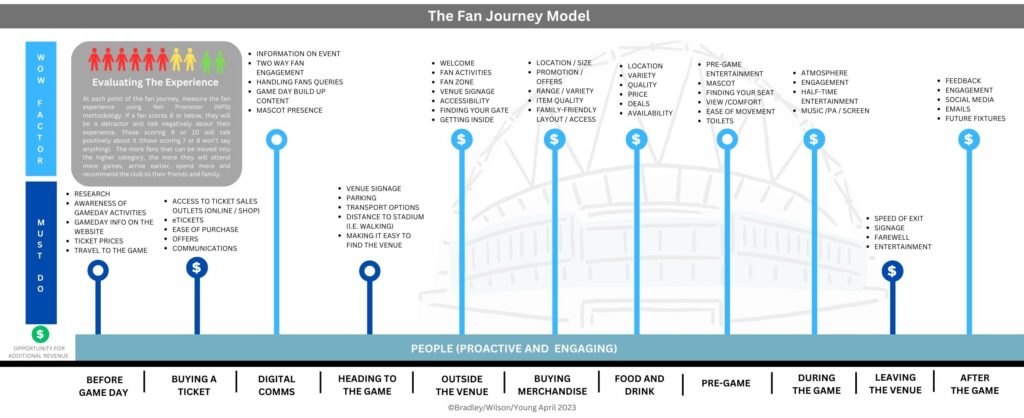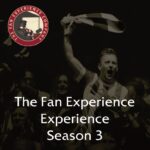The Fans Journey - Part 11: Leaving The Venue
Me and my Dad had a great ‘mass’ routine going back in the County Durham of the late 70s.
Let me tell you more.
Because my Mam played the organ at the local church, she had to be present for the extremely long mass that kicked off at 9.30 on a Sunday morning.
Thank the Lord that it wasn’t said in Latin either or she’d have been there all day. That all ended in the late 60s, I think. But with the addition of a few hymns, three readings and a very long sermon, we rarely saw my Mam back home before 11.30. But we were in and out and back home reading the Sunday Post and devouring bacon, egg and toast in half an hour.
My Dad’s interpretation of the Catholic doctrine was less stringent. He took me to the 8.00 a.m. mass. For this one, Father O’Brien dispensed with the hymns and the sermon: racing through everything in less than half an hour. We’d get there at 7.59, sit at the back and be first out at 8.30 on the dot.
Change the timings to 2.59 and 4.45 and change the day to Saturday and you’d be describing the typical supporter’s arrival and departure times at any most football matches I saw as a kid - with the notable difference that no one turned up to mass immediately after consuming 3 pints at a local pub*.

Mark Bradley
@fanexperienceco
Mark founded the Fan Experience Company in 2005 to build attendance growth and community engagement on the basis of improving fan experiences. He recently created FC Barcelona’s Barça Innovation Hub’s first fan engagement study certificate. The Fan Experience Company has undertaken more than 3,500 fan experience assessments in many countries for clients as diverse as The Danish Superliga, The EFL, The WSL / WC, United Rugby and Premiership Rugby.

Geoff Wilson
@fanexperienceco
Geoff runs his own Sports Consultancy, working with clients such as FIFA, UEFA, AFC and FIBA across the world. He is also on the board of Tourism Northern Ireland. You can follow Geoff on twitter @geoffwnjwilson connect on Linkedin at linkedin.com/in/geoffwnjwilson

Darren Young
@fanexperienceco
Darren joined the Fan Experience Company in 2017. He has an MBA with a background in customer service excellence having worked as a consultant in that field for a number of years. As well as being responsible for all of the assessment summary reports that are produced each season, he has also worked with a number of clubs on an individual basis, including Lincoln City, Walsall, Grimsby Town, Nottingham Forest and OH Leuven on projects ranging from staff development to supporter feedback surveys.
[*They did that afterwards instead – and the parish priest often joined them too.]
Fans’ habits take a lot of breaking and football, in particular, has been slow to find ways to extend supporters’ dwell time on match days. In recent times however, the sport has transformed the pre-match experience with fan zones, live entertainment, family activities, craft beer, street food and excellent partner activations. After the game though, it still tends to behave as if it were Father O’Brien in 1979. ‘Off you go. See you next week.’
There will still be fans for whom the sacred pre-match ritual depends on ordering a pint of Guinness at the local hostelry at a time when most of us are already in our place in the stadium watching the players take the field. But for the majority these days, the pre-match experience can extend all the way back to 1pm. It’s become an expectation (and when a League One club can clear £10k at one game just on fan zone beer, it’s bad business practice not to do it afterwards too).
So it’s surprising that football does so little for fans immediately post-match. It’s almost as if clubs view this period as having a default setting of ‘disappointment’: even more surprising when so many games could be turned on their heads around 5.15pm (It took 132 minutes and 24 seconds to complete the match between Wycombe Wanderers and Stevenage in November).
Some stadiums have sports bars: making it easy to gather after the game and discuss the afternoon’s incidents of note. Tottenham Hotspur’s new stadium appears to have been purposely designed to keep fans in but, for the majority of clubs, fans’ immediate post-game options are exclusively off-site.
Rugby clubs know that the end of the game heralds a chance to let its USP shine. Among other things, the players soon re-appear in the club house where they’re happy to chat with everyone about the game (regardless of the result).
And that’s at all levels. My first rugby union game was in Sydney in (their) winter of 2012 when I saw Australia narrowly beat Wales on a sunny June afternoon. Shortly after the final whistle, there was another sound to announce that the public could walk on to the pitch, speak to players and play tag rugby. The surreal nature of this sight to a football fan was amplified by the darkness that fell as the game ended.
When we were working for FIFA in Qatar at the men’s World Cup finals exactly a year ago, there was always plenty to do after the game. Perhaps this was to stagger fans’ departure and to relieve the pressure on the newly-built metro system, but the wonderful entertainment had the effect of making staying on site the most natural thing to do.
In summer, a fan zone is a great way to spend the pre-match period, but why wouldn’t a fan zone tick all of the supporter’s boxes after a game at the height of winter? A few braziers to warm us up, some mulled wine, hot soup, live music, a few legends and squad players around and I’d not be home much before Match of the Day.
None of this is a risk nor it is illogical. It appears that the only barrier is cultural. ‘It’s what we’ve always done’ is perhaps unsurprising in an industry where it often appears that a finite group of CEOs just moves from one club to another on a seasonal basis. We need fresh thinking.
Those old special socks, the only possible walking route and that last late pint could be mirrored by a whole host of new rituals that take place in or adjacent to the stadium.
Brazier suppliers, stand by!


If you’d like help with this or other game day touch points, then make sure to listen in to The Fan Experience Experience podcast (on Spotify, Apple Podcasts and via Buzzsprout); to visit www.fanexperienceco.com or to email us via [email protected].
Mark Bradley, Geoff Wilson and Darren Young assessed the fan experience at eight matches at the 2022 World Cup in Qatar. Click here to read more about what they found there.